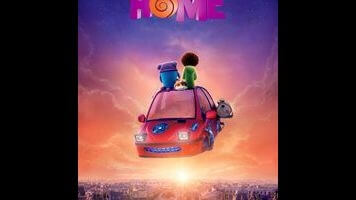DreamWorks warps an offbeat kids’ book into the typically generic Home

DreamWorks Animation has established such a distinctive (and distinctively pandering) brand that its creative successes are defined principally by the degree to which they do not resemble a typical DreamWorks cartoon. By that metric, Home seems, at first, like their best feature since The Croods. Though it opens with the studio’s seemingly mandatory voice-over setup, the story itself, adapted from the children’s book The True Meaning Of Smekday, shows immediate conceptual audacity. Oh (voiced by The Big Bang Theory’s Jim Parsons), a squishy little alien without any friends, cheerfully explains that his race, called the Boov, has arrived on Earth to hide from the Gorg, another alien race that has pursued them across the galaxy. The Boov are led by Captain Smek (Steve Martin), who is “best at running away,” and their hiding involves forcefully relocating Earth residents to a single gated community called Happy Humanstown while they enjoy the rest of the planet.
The Boov zip around using bubble-based technology, change color when they feel different emotions, and periodically group objects they find useless (like park benches) into makeshift spheres, which hover above the city like tiny moons. This sci-fi weirdness unfolds at the familiar DreamWorks pace—jabbering, borderline frantic—but the style feels more elastic, with occasional low-angle and overhead shots mixed into the animated cinematography. The character designs are inventive, the jokes aren’t just references, and for a little while, Home proceeds with a feeling perfectly suited for, but too often rare in, animated films: the sense that it might go anywhere.
That the movie eventually sets out for a heartfelt buddy comedy is the first of its minor but accumulating disappointments. Oh, who speaks in the same tense-shifting, agreement-challenged version of English as his fellow Boov, accidentally alerts the Gorg to their location, and goes on the run to avoid punishment. He meets Tip (Rihanna), a human tween who avoids capture and lives alone, unaware that her mother (Jennifer Lopez) has been taken to live with the rest of the native population in Happy Humanstown. Together, they set out to find Tip’s mom.
Along the way, the two bond while listening to several Rihanna songs, and the movie pipes in more on its soundtrack, which also includes a song by Lopez (whose participation is probably at least partially an in-joke based on a detail from the original book strangely not included in the movie version). The role of a 12-year-old girl is played by a twentysomething non-actor with a low-ish, sometimes sleepy voice, a casting gambit that recalls the worst celebrity-worshipping tendencies of DreamWorks’ past. (To Rihanna’s partial credit, Tip only sometimes sounds like a stilted adult.) But it’s especially intrusive to have that same voice singing song after overproduced song in the background.
These missteps don’t immediately sink Home; Parsons and Martin both give fine, funny voice-over performances, and the neat visuals don’t disappear. Kids will probably like it. Slowly, though, the film reveals its DreamWorks bona fides: Alongside the incessant and pseudo-adult soundtrack, there’s a slapstick gag that depends on a sudden shift to slow motion, and—total non-spoiler alert—an ultra-hacky dance-party ending. This may be less surprising to fans of the Smekday book, from which the movie apparently departs relatively quickly, or to viewers of Mr. Peabody And Sherman, the company’s last attempt to squeeze idiosyncratic source material into a DreamWorks template. But it’s still disheartening to watch Home turn formulaic. DreamWorks movies are often about outsiders learning that they don’t have to fit in, a lesson the filmmakers may not have absorbed themselves. Instead of embracing weirdness, the company treats it more like a maze: something to get out of before 90 minutes are up.